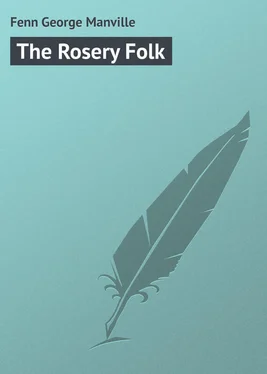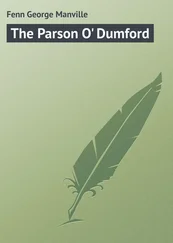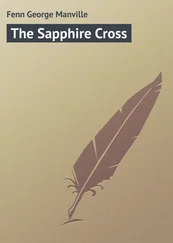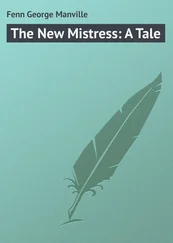George Fenn - The Rosery Folk
Здесь есть возможность читать онлайн «George Fenn - The Rosery Folk» — ознакомительный отрывок электронной книги совершенно бесплатно, а после прочтения отрывка купить полную версию. В некоторых случаях можно слушать аудио, скачать через торрент в формате fb2 и присутствует краткое содержание. Жанр: foreign_prose, на английском языке. Описание произведения, (предисловие) а так же отзывы посетителей доступны на портале библиотеки ЛибКат.
- Название:The Rosery Folk
- Автор:
- Жанр:
- Год:неизвестен
- ISBN:нет данных
- Рейтинг книги:5 / 5. Голосов: 1
-
Избранное:Добавить в избранное
- Отзывы:
-
Ваша оценка:
- 100
- 1
- 2
- 3
- 4
- 5
The Rosery Folk: краткое содержание, описание и аннотация
Предлагаем к чтению аннотацию, описание, краткое содержание или предисловие (зависит от того, что написал сам автор книги «The Rosery Folk»). Если вы не нашли необходимую информацию о книге — напишите в комментариях, мы постараемся отыскать её.
The Rosery Folk — читать онлайн ознакомительный отрывок
Ниже представлен текст книги, разбитый по страницам. Система сохранения места последней прочитанной страницы, позволяет с удобством читать онлайн бесплатно книгу «The Rosery Folk», без необходимости каждый раз заново искать на чём Вы остановились. Поставьте закладку, и сможете в любой момент перейти на страницу, на которой закончили чтение.
Интервал:
Закладка:
“Oh, but it is horrible.”
“Dreadful!” echoed Prayle.
“Then I must have been an idiot to introduce it here, where all is so calm and peaceful,” said the doctor. “Fancy what a shock it would give us all if we were suddenly to hear an omnibus go blundering by. James Scarlett, you are a lucky man. You have everything a fellow could desire in this world: money, a delightful home, the best of health – ”
“The best of wives,” said Prayle softly. “Thank you for that, Arthur,” said Scarlett, turning and smiling upon the speaker.
“Humph! Perhaps I was going to say that myself,” said the doctor sourly. “Hah! you’re a lucky man.”
“Well, I don’t grumble,” said Scarlett, laughing. “You fellows come down here just when everything’s at its best; but there is such a season as winter, you know.”
“Of course there is, stupid!” said the doctor. “If there wasn’t, who would care for fickle spring?”
“May the winter of adversity never come to your home, Cousin James,” said Prayle softly: and he looked at his frank, manly young host with something like pathetic interest as he spoke.
“Thank you, old fellow, thank you. – Now, let’s join the ladies.”
“This fellow wants to borrow fifty pounds,” growled Doctor Scales. Then after a pause – “There’s that itching again in my toes.”
Volume One – Chapter Six.
Doctor Scales hears a Morning Lecture
“Morning, Monnick,” said the doctor, who had resigned himself to his fate, and had passed three days without attempting to escape from his pleasant prison.
“Morning, sir,” said the old gardener, touching his hat.
“Sir James down yet?”
“Oh yes, sir, he’s been in the peach-house this last hour.”
“Has he? thanks,” said the doctor, walking on in that direction, to hear his old friend’s voice, directly after, humming away beneath the glass like some gigantic bee.
“Hallo, lazybones!” cried Sir James, who was busy at work with a syringe water-shooting the various insects that had affected a lodgment amongst his peach and nectarine trees.
“Lazybones; be hanged! why, it’s barely five.”
“Well, that’s late enough this weather. I love being out early.”
“Work of supererogation to tell me that, old fellow.”
“So it is, Jack, and I suppose I’m a monomaniac. Fellows at the club laugh at me. They say, here you are – with plenty of money, which is true; heaps of brains – which is not; a title and a seat in the house, openings before you to get some day in the cabinet, and you go down in the country and work like a gardener. They think I’m a fool.”
“Let ’em,” said the doctor, grimly.
“But I am a bit of a lunatic over garden matters, and country-life, Jack.”
“So much the better,” said the doctor, lighting a cigar and beginning to walk up and down. “Go on with your squirting.”
“Shan’t! I shall follow your bad habit.” And Sir James took one of his friend’s cigars and began to smoke. “Pleasure and profit together,” he said; “it will kill insects.”
“Nice place, this,” said the doctor, glancing about the large light structure, with its healthy fruit trees growing vigorously; “but I should be careful about sudden changes. Might get a cold that would affect you seriously.”
“Out, croaker!” cried Sir James; “I never catch cold.” And he perched himself upon a pair of steps.
“Going to preach?” said the doctor, “because if so I’ll sit down.”
“Then sit, for I am, sir, a charity sermon; but there will be no collection after I have done.”
“Go ahead,” said the doctor.
“My dear guest,” said Sir James, “there is nothing pleasanter than being, through your own foresight, on the right side of the hedge. The bull may bellow and snort, and run at the unfortunates who carelessly cross the dangerous meadow, but it does not hurt you, who can calmly shout to those in danger to run here or there to save themselves from horns or hoofs. In the same way how satisfactory to float at your ease when the flood comes, and to see your neighbours floundering and splashing as they struggle to bank or tree, hardly saving themselves, while you, armed as you are with that pocket. Noah’s Ark of a safety-belt, philosophically think, what a pity it is that people will not take precautions against the inevitable.”
“What are you aiming at, Jemmy?” said the doctor.
“Sir,” said Sir James, waving his cigar; “I take this roundabout way of approaching that most popular though slightly threadbare subject, the weather; and as I do so I cannot help, in my self-satisfied way, feeling a kind of contemptuous compassion for those who, being agriculturally or horticulturally disposed, go out metaphorically without macintosh, umbrella, or goloshes. It is in this spirit that I feel but small pity for unfortunate Pat who, knowing that Erin is so green on account of its heavy rainfall, will persist in making the staple of his growth the highly satisfactory but tropical potato – that child of the sun which blights and rots and dies away in a humid atmosphere, the consequence of our heavy downpours of rain. ‘But we must have potatoes,’ say both Pat, and John Bull. True: then do as I, Ajax, the weather defier, have done: grow early sorts, which flourish, ripen, and can be housed before the setting in of the heavy autumnal rains.”
“Hear, hear,” said the doctor, sitting back in his wicker chair and holding his fuming cigar in the middle of a peach-tree, where some insects had effected a lodgment.
“That’s right, doctor, give them a good dose,” said Sir James following suit. “But to proceed. It is not apropos of tubers that I indulge this spring in a pleasant warm feeling of self-satisfaction, but on account of wall-fruit – the delicious plum, a bag of golden saccharine pulp, or a violet bloomed, purple-skinned mass of deliciously flavoured amber; the downy-skinned peach, with a ruddy tint like that of a bonny English maiden’s cheek; the fiery stoned luscious nectarine – that vinous ambrosial fruit that ought to be eaten with the eyes closed that the soul may dream and be transported into transports of mundane bliss; item, the apricot, that bivalve of fruits which will daintily split into two halves, to enable you to drop the stone before partaking of its juicy joys. Come good season or bad season your Londoner sees the pick of these princes of the fruit world reposing in perfect trim in the market or window; but in such an autumn as the past it was melancholy to walk round one’s friends’ gardens – say with Tompkins or Smith or Robinson, each of whom spends a little fortune upon his grounds, over which Macduff or Macbeth or Macfarlane, or some other ‘gairdner fra’ the North,’ tyrannically presides. The plums upon the most favoured walls were cracked, and dropped spoiled from the trees; the peaches looked white and sickly, and were spotted with decomposition; the nectarines that consented to stay on the twigs were hard and green, and where one that approached the appearance of ripeness was tasted, it was watery, flavourless, and poor.”
“Watery, flavourless, and poor, is good,” said the doctor. “I don’t often buy wall-fruit, but if I do spend sixpence in the Central Avenue, Covent Garden, that is about the state of the purchase.”
“Exactly,” said Sir James eagerly, “and it is impossible to help triumphing in one’s pity while one reasonably says, ‘Why attempt to grow out-of-doors the tender fruits of a warmer clime in such a precarious country as ours? Or, if you must grow them, why not metaphorically provide your peaches, nectarines, apricots, and choice plums with goloshes, macintoshes, and, above all, with an umbrella?’ I do, and I egotistically take my friends to see the result. Their trees are drenched, desolate, and the saturated ground beneath is strewn with rotting fruit. My trees, on the contrary, have their toes nice and warm; their bodies are surrounded by a comfortable great coat; and, above all, their delicate leaves and still more delicate blossoms are sheltered by a spreading umbrella of glass. In other words I grow them in an orchard house, and the result is that they are laden with luscious fruit.”
Читать дальшеИнтервал:
Закладка:
Похожие книги на «The Rosery Folk»
Представляем Вашему вниманию похожие книги на «The Rosery Folk» списком для выбора. Мы отобрали схожую по названию и смыслу литературу в надежде предоставить читателям больше вариантов отыскать новые, интересные, ещё непрочитанные произведения.
Обсуждение, отзывы о книге «The Rosery Folk» и просто собственные мнения читателей. Оставьте ваши комментарии, напишите, что Вы думаете о произведении, его смысле или главных героях. Укажите что конкретно понравилось, а что нет, и почему Вы так считаете.












